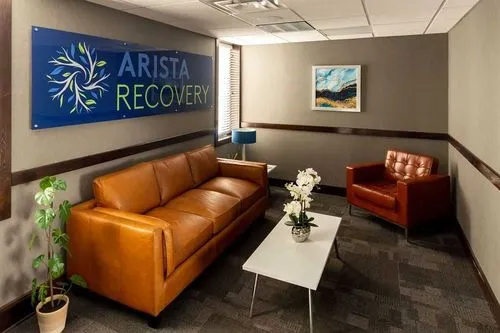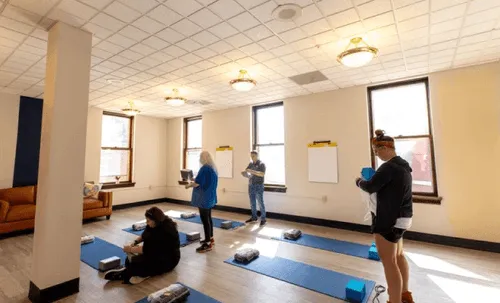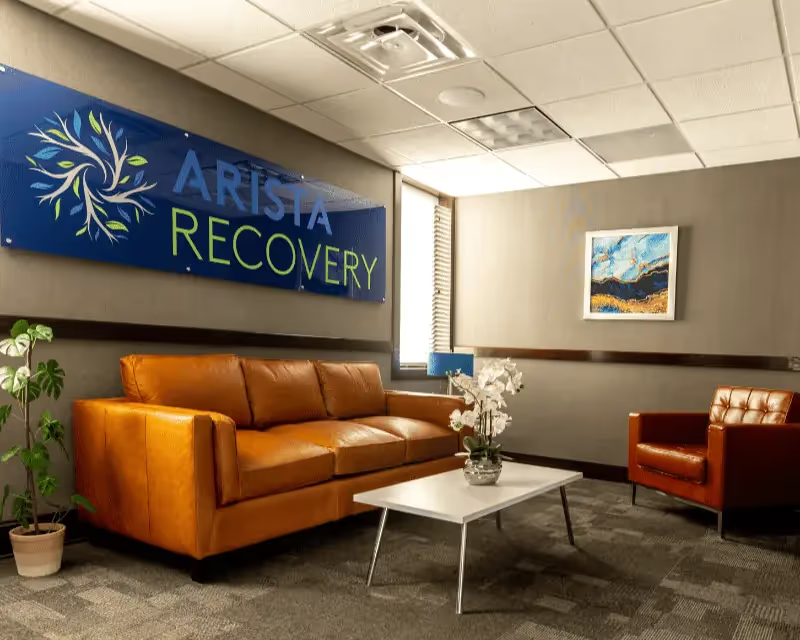Oxycodone Rehab In Kansas
.webp)
What is Oxycodone?
Oxycodone is a type of opioid pain medication that can be habit-forming and lead to oxycodone addiction. Oxycodone works by altering the way the nervous system and brain react to pain and can come in liquid, tablet, or capsule form. Oxycodone is used for around-the-clock treatment and should not be used for pain that can be treated occasionally.
Opioid Dependence vs. Misuse
To understand the difference between dependency and misuse it is also important to know the distinction between dependency and addiction. Addiction is a result of physical changes to your brain whereas dependency is the natural increase of tolerance to a substance to the extent that if stopped one would enter into withdrawal. Dependence can occur without an addiction but is a stepping stone to addiction.
If a patient develops an oxycodone dependency it may lead to misuse in the form of oxycodone drug addiction, but this is not always the case. The majority of patients who are legally prescribed can stop usage without ever establishing an oxycodone drug addiction. However, it is still likely for patients who have been using prescribed oxycodone for a prolonged period to develop a dependency (high tolerance) which can result in withdrawal if the medication is stopped on short notice. Typically, patients who develop a dependency are eased off the medication through decreased doses avoiding most of the major withdrawal symptoms.
Despite the majority of patients who are prescribed opioids never becoming addicted there are about 15% who do become addicted (1). To learn more about the signs of misuse continue reading below.
Signs of Oxycodone Addiction
Patients or individuals who are misusing and have developed an oxycodone addiction may continually report lost prescriptions and ask for a refill early. Those with an oxycodone addiction may also claim the medication is no longer effective; however, just because a patient has requested a higher dose does not mean it is a direct sign of addiction. The direct sign is if the person requesting a higher dose continues to claim they are getting worse instead of better with a higher dose (1).
Other signs of oxycodone misuse include:
Behavioral Symptoms
- Selling medications
- Falsifying a prescription
- Taking other’s prescription
- Neglecting all responsibilities
- Lying
Physical Symptoms
Physical symptoms of oxycodone addiction:
- Slurred speech
- Drowsiness
- Dizziness
- Itching
- Headaches
- Dry mouth
- Constipation
- Nausea and vomiting
- Pupil constriction
- Impaired coordination
- Disrupted sleep
- Appetite changes
- Psychomotor agitation or retardation
Psychosocial Symptoms
Psychosocial symptoms of oxycodone addiction:
- Extreme mood swings
- Outbursts of anger and violence
- Anxiety
- Paranoia
- Depression
- Euphoria
- Irritability
- Social withdrawal
Cognitive Symptoms
Cognitive symptoms of oxycodone addiction:
- Inability to concentrate or focus
- Memory problems
- Impaired judgment
- Hallucinations
- Paranoia
- Delusions
Don't Wait Any Longer Get in touch
Common Drug Combinations
Marijuana, benzodiazepines, and other stimulants are commonly combined with the depressant oxycodone to help amplify or mask the effects. Those with an oxycodone addiction may know this combination of a stimulant and an opioid as ‘Speed-balling’.
Oxycodone is most dangerous when combined with alcohol or benzodiazepines as all three substances are depressants and target the central nervous system resulting in a high risk of a fatal overdose or irreversible brain and organ damage. The problem becomes worse as patients begin describing different symptoms to different doctors to obtain both prescription medicines. According to CBS News, there was a 2.5 million person (or 41 percent) increase from 2002 to 2014 of patients prescribed both opioid painkillers and benzodiazepines (2).
Opioid Addiction Statistics
Whether you have become addicted to oxycodone through prescription abuse or acquired unprescribed oxycodone (also known as Oxy, Percs, Rims, Tires, Greenies, or Hillbilly Heroin) here are some informative statistics for those directly or indirectly affected by oxycodone addiction.
Here are a few staggering facts about fentanyl, coming from the experts who know it best—the DEA.
- In 2018 nearly 50,000 people died from opioid-related death (5).
- The US roughly accounts for 80% of the world’s total oxycodone prescriptions based on data collected by the National Institute on Drug Abuse (NIDA)
- About 21 to 29 percent of patients prescribed opioids for chronic pain misuse use them.
- 8 to 12 percent of people using an opioid for chronic pain develop an opioid use disorder .
- 4 to 6 percent who misuse prescription opioids transition to heroin (6).
Unfortunately, dealers will sell fentanyl under the disguise as a more expensive drug, such as oxycodone, widening the likelihood an overdose may occur.
Furthermore, fentanyl is many times added to heroin to up its potency. This again results in a large number of overdoses because the buyer was unaware they were purchasing a different type of drug.
The consequence of pushing fentanyl can end up being life in prison.
For a Schedule II drug, such as fentanyl, the legal consequences are as follows:
- First offense: Not less than 5 yrs. and not more than 40 yrs. If death or serious bodily injury, not less than 20 yrs. or more than life. Fine of not more than $5 million if an individual, $25 million if not an individual.
- Second offense: Not less than 10 yrs. and not more than life. If death or serious bodily injury, life imprisonment. Fine of not more than $8 million if an individual, $50 million if not an individual.Common Drug Combinations
Those who do not overdose and die from using illicit fentanyl will deal with quite uncomfortable and difficult withdrawal effects when they decide to stop or detox in a fentanyl addiction treatment center.
Withdrawal Effects of Oxycodone
Whether a patient has developed an oxycodone addiction or not they will experience withdrawal effects if they have developed a physical dependence on oxycodone. Some patients who go through withdrawal will experience opioid-induced hyperalgesia (OIH). Opioid-induced hyperalgesia is when a patient receives opioid treatment and becomes more sensitive to pain (3). OIH typically happens while a patient is weaning off of the opioid. Major withdrawal symptoms can typically be avoided with a gradual reduction of dose over some time (4).
These are typical signs that someone is abusing opioids:
- Insomnia
- Runny nose
- Elevated blood pressure
- Agitation
- Anxiety
- Sweating
- Abdominal cramping
- Diarrhea, nausea, and vomiting
- Muscle aches
- Dilated pupils
If you or someone you know needs help as they go through withdrawal contact us over the phone or through our website to learn how we can help.
What We Do
Treatment Programs at Arista
Make the Call That Will Change Your Life.
Speak to one of our caring intake coordinators 24 hours a day, 7 days a week.

Commonly Asked Questions
Why is oxycodone addictive?
Oxycodone is addictive because when taken individuals experience an extreme state of euphoria due to increased dopamine in the brain. Drugs that impact brain chemistry can lead to addiction. With extended lengths of use, individuals build up a dependency on the drug and can experience withdrawal symptoms in between uses. Dependency does not necessarily mean addiction but can lead to addiction.
How do people get addicted to oxycodone?
Most people who are prescribed oxycodone will not become addicted. However, those who continually take oxycodone over a prolonged period may establish a physical dependency. Those who develop a dependency are not necessarily addicted but only if they abuse the drug may they become addicted. Read more about signs of oxycodone abuse by visiting our website.
Our Unique Therapies
Explore our innovative approach to addiction treatment at Arista Recovery. From evidence-based therapies to holistic and experiential methods, we offer an immersive experience that works to treat the root causes of substance abuse our full continuum treatment programs












Educational Therapy for Addiction Recovery
Explore Educational Therapy at Arista Recovery and how it can help you recover.
Art Therapy for Addiction Recovery | Arista Recovery
Explore art therapy at Arista Recovery and how it can help you recover.
Cognitive Behavioral Therapy (CBT) for Addiction Recovery
Explore cognitive behavioral therapy at Arista Recovery and how it can help you recover.
Dialectical Behavioral Therapy (DBT) for Addiction Recovery
Explore dialectical behavioral therapy for addiction treatment and how it can help you recover.
Trauma Therapy for Addiction Recovery
Explore trauma therapy at Arista Recovery and how it can help you recover.
Group Therapy for Addiction Recovery | Arista Recovery
Explore group therapy at Arista Recovery and how it can help you recover.
Horticultural Therapy for Addiction Recovery in Kansas
Explore horticultural therapy at Arista Recovery and how it can help you recover.
Sand Tray Therapy For Adults | Arista Recovery
Explore sand tray therapy at Arista Recovery and how it can help you recover.
Equine Therapy for Addiction Recovery | Arista Recovery
Explore equine therapy at Arista Recovery and how it can help you recover.
Experiential Therapy for Addiction Recovery
Explore experiential therapy at Arista Recovery and how it can help you recover.
Synergistic Therapy Recovery Program | Arista Recovery
Our Synergistic Recovery Program programs in Kansas City provides effective training, both in the physical and mental domains.
We're proud to accept most insurances
Most major insurance plans can help cover up to 100% of the cost of treatment at Arista Recovery. Fill out our free insurance benefits form now and get started on your journey to long-term healing. You deserve it.










Oxycodone Addiction Treatment in Kansas
There are several different types of oxycodone addiction treatment options for those who have developed oxycodone addiction. Typically, oxycodone addiction treatment is a combination of medication-assisted treatment (MAT) and counseling and behavioral therapies.
Currently, there are several MAT-approved medications including Buprenorphine, Methadone, Naltrexone, and Naloxone (7).
- Buprenorphine suppresses and reduces opioid cravings.
- Methadone reduces opioid cravings while minimizing the effects of withdrawal.
- Naltrexone prevents the euphoria sensation caused by opioids.
- Naloxone helps reverse the effects of an overdose in an attempt to prevent overdose.
- 4 to 6 percent who misuse prescription opioids transition to heroin (6).
Each of the MAT-approved treatment options should be paired with some form of therapy.
The best treatment for oxycodone addiction is a combination of medication-assisted treatments (MAT) and counseling and behavioral therapies. If you or someone you know wants to learn more about the treatment options available please give us a call now or contact us through our website.












